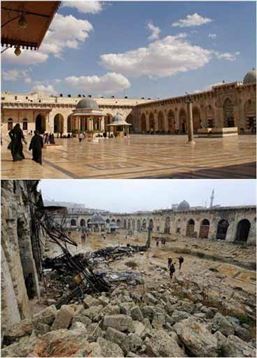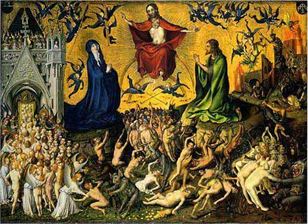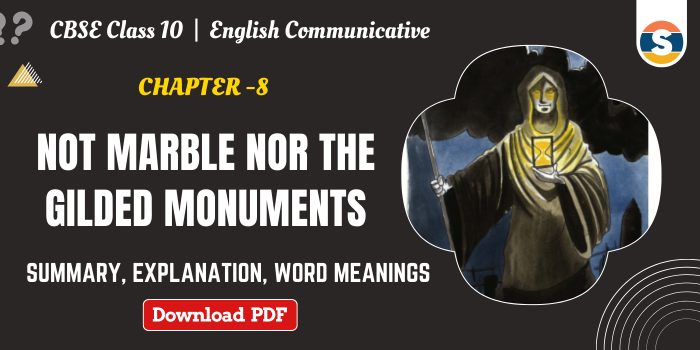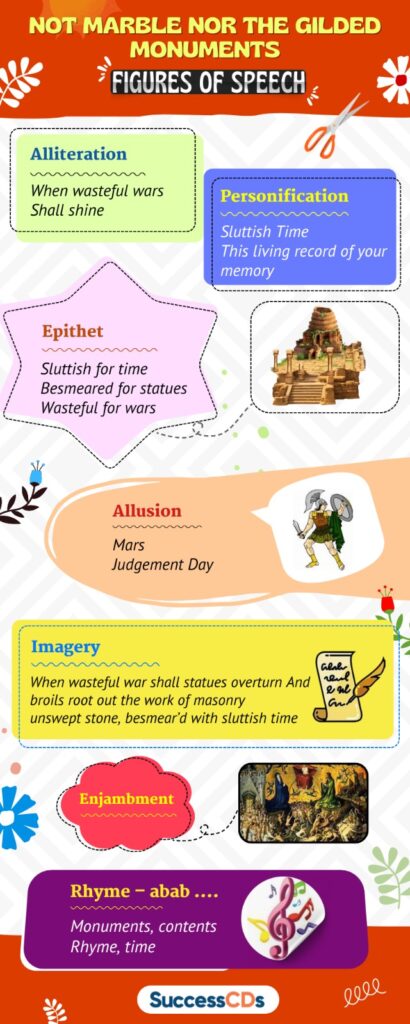CBSE Class 10 English Chapter 8 Not Marble nor the Gilded Monuments Summary, Explanation along with Difficult Word Meanings from Literature Reader (Communicative) Book
Not Marble, nor the Gilded Monuments Class 10 poem summary and explanation of the poem along with meanings of difficult words and literary devices used in the poem can be seen in this post. Also, the Summary is followed by a detailed explanation of the lesson. This page includes complete notes on the chapter Not Marble, nor the Gilded Monuments
- Class 10 Not Marble nor the Gilded Monuments Summary
- Not Marble nor the Gilded Monuments Previous Year Questions with Model Answers PDF
- Class 10 Not Marble nor the Gilded Monuments Summary in Hindi
- Not Marble nor the Gilded Monuments Explanation
- Literary devices of Not Marble nor the Gilded Monuments
- Not Marble nor the Gilded Monuments FAQs
Related:
- Class 10 Not Marble nor the Gilded Monuments (Important) Questions and Answers
- Not Marble, Nor the Gilded Monuments MCQ
- Not Marble, Nor the Gilded Monuments Previous Years Question with Answers
Not Marble nor the Gilded Monuments PDF Download here
Author: William Shakespeare
Sonnet- A sonnet is a poetic form which originated in Italy. The term sonnet is derived from the Italian word ‘sonetto’ which means little poem. By the thirteenth century it signified a poem of fourteen lines that follows a strict rhyme scheme and specific structure.
Not Marble nor the Gilded Monuments Summary
Given below is the summary of Not Marble nor the Gilded Monuments.
Not Marble, nor the Gilded Monuments is the 55th sonnet written by William Shakespeare. It tells about the limitations of worldly glory and grandeur (impressiveness) All the great monuments, memorials and statues erected by princes, rulers and the rich to perpetuate (maintain) their memory are subject to decay, destruction and deterioration. (failure) The ravages of time and the agents of destruction destroy and damage all such monuments and memorials. Only the powerful rhyme of the poet and great poetry will survive the ravages (destruction) of time. Through the written words of this poem, the poet will immortalize the memory of his friend till the day of the Last Judgment.
Not Marble nor the Gilded Monuments Previous Year Questions with Model Answers PDF
Download the previous year questions of the Lesson Not Marble nor the Gilded Monuments of class 10 (Communicative) for free. With the help of this, you can prepare for the exam.
To Download Not Marble nor the Gilded Monuments Previous Year Questions with Model Answers- Click Here
Not Marble nor the Gilded Monuments – Summary (in Hindi)
न मार्बल, न ही गिल्डेड मॉन्यूमेंट्स विलियम शेक्सपियर द्वारा लिखित 55वां सॉनेट है। यह सांसारिक महिमा और भव्यता (प्रभावशीलता) की सीमाओं के बारे में बताता है। राजकुमारों, शासकों और अमीरों द्वारा अपनी स्मृति को बनाए रखने के लिए बनाए गए सभी महान स्मारक, स्मारक और मूर्तियाँ क्षय, विनाश और गिरावट के अधीन हैं। समय की मार और विनाश के एजेंट ऐसे सभी स्मारकों और स्मारकों को नष्ट और क्षतिग्रस्त कर देते हैं। केवल कवि की सशक्त छंद और महान काव्य ही समय की मार (विनाश) से बचे रहेंगे। इस कविता के लिखित शब्दों के माध्यम से, कवि अपने मित्र की स्मृति को अंतिम न्याय के दिन तक अमर बनाए रखेगा।
Not Marble nor the Gilded Monuments Poem Explanation
Quatrain 1-
Not marble, nor the gilded monuments
Of princes, shall outlive this powerful rhyme;
But you shall shine more bright in these contents
Than unswept stone, besmear’d with sluttish time
Word meaning
gilded: covered with gold; gold-plated
these contents: refers to this poetry
unswept stone: a stone monument left uncared for
besmear’d: tarnished
sluttish: of unclean habits and behavior
Explanation – The poet says that this piece of poetry will remain alive longer than the stone statues and gold – plated monuments built by royal men. (The royal men build statues and monuments so that they become immortal and are remembered by the future generations). The poet’s beloved soldier referred to as ‘you’ shall be remembered through this powerful poetry. In comparison to the statues which will be neglected and wear out with the passage of time, the poetry will remain shining and fresh as ever. Through the poetry, the poet’s beloved will also shine for all times to come.
Quatrain 2 –
 When wasteful war shall statues overturn,
When wasteful war shall statues overturn,
And broils root out the work of masonry,
Nor Mars his sword nor war’s quick fire shall burn
The living record of your memory
Word meaning
broils: tumult, fighting, disturbances, esp. in war
work of masonry: refers to monuments built by masons
Mars: the god of war
Sword: a weapon with a long metal blade
quick: lively, fast moving, searching out
living record: this written memory of your life which continues after you are dead
Explanation – The poet says that wars are wasteful as they destroy the statues built by the royal men. Such fights are destructive as they destroy the great monuments and turn them into ruins. This poetry that has been written in the memory of the brave man cannot be destroyed even by the greatest warrior Mars. It will survive through all the wars.
Quatrain 3
‘Gainst death and all oblivious enmity
Shall you pace forth; your praise shall still find room,
Even in the eyes of all posterity
That wear this world out to the ending doom
Word meaning
Gainst: against
oblivious enmity: enmity which is forgetful of everything and so seeks to destroy everything
pace forth: stride forwards
posterity: future generations
doom: doomsday; the day on which the Last Judgment will occur
Explanation – Even after his death and in the face of all his enemies, the brave man shall remain alive through this poem. All the generations that will be born on this Earth till the end of the world will read this poem and praise the poet’s beloved.

Couplet –
So, till the judgment that yourself arise,
You live in this, and dwell in lovers’ eyes.
Word meaning
Judgement: the day of the last judgement
Dwell: live
Explanation – The poet refers to the ‘Judgement day’ when the dead will arise out of their graves and Jesus Christ will descend on the Earth to judge their acts. He says that till the day of judgement when his beloved will arise out of his grave, he will remain alive through this poem. Everyone who reads the poem will praise the brave man and thus, he shall live in the eyes of his beloved.
Important Videos Links
Not Marble Nor the Gilded Monuments Explanation, Literary devices, meanings CBSE Class 10
Literary devices in the poem
1. Allusion – reference to ‘Mars’ – the God of war and ‘Judgement’ – the day of judgement.
2. Alliteration – ‘when wasteful wars’ – ‘w’ sound repeated, ‘shall shine’ – ‘sh’ sound repeated
3. Personification – ‘Time’ has been called a ‘slut’ and thus, personified. This poetry has been personified when called ‘living record’.
4. Repetition – ‘shall’ and ‘nor’ repeated to create musical effect
5. Epithet – an adjective or adjectival phrase used to describe a distinctive quality of a person or thing. ‘Sluttish’ describes time, ‘besmeared’ describes statues, ‘wasteful’ describes wars.
6. Imagery – visual imagery is used in ‘unswept stone, besmear’d with sluttish time’ as the reader can imagine statues which become ruins with the passage of time and ‘When wasteful war shall statues overturn And broils root out the work of masonry’ as the reader can imagine the destruction caused by wars.
Important Questions Videos Links
Not Marble nor the Gilded Monuments FAQs
Q1. What does not marble nor the gilded monuments mean?
Ans. Not Marble nor the Gilded Monuments means that neither statues made of marble nor the monuments covered with Gold will remain intact for a longer period of time than the powerful poetry written by the poet.
Q2. What is the theme of the poem ‘Not Marble nor the gilded monuments’?
Ans. The theme of the poem is the ruinous power of time which destroys all statues and monuments. The poem also conveys the power and longevity of the written word. The praise of the brave men shall remain alive forever through the powerful poetry written by the poet.
Q3. What is a sonnet?
Ans. Traditionally, a sonnet is a poem of 14 lines. It consists of an octave (or two quatrains making up a stanza of 8 lines) and a sestet (a stanza of six lines).
Q4. Will the grand memorials become eroded?
Ans. The god of war, Mars will have a destructive effect on all statues of stone and monuments gilded with gold. Gradually, these structures will erode, due to the wars and the ruinous time.
Q5. What does the word “Marble” used in ‘Not Marble nor the Gilded Monuments’ mean?
Ans. The word “marble” means statues made of stone or marble.
Also See:
- Julius Caesar Class 10 English Summary, Explanation, Difficult Words
- Snake Class 10 English Summary, Explanation, Difficult Words
- The Rime of the Ancient Mariner Class 10 English Summary, Explanation, Difficult Words
- Ozymandias Class 10 English Summary, Explanation, Difficult Words
- Poem Mirror Class 10 English Summary, Explanation, Difficult Words
- The Frog and the Nightingale Class 10 English Summary, Explanation, Difficult Words
- VIRTUALLY TRUE Class 10 English Summary, Explanation, Difficult Words
- Two Gentlemen of Verona Class 10 English Summary, Explanation, Difficult Words
- The Letter Class 10 English Summary, Explanation, Difficult Words
- Mrs. Packletide’s Tiger Class 10 English Summary, Explanation, Difficult Words
- Patol Babu, Filmstar Class 10 English Summary, Explanation, Difficult Words
- Shady Plot Class 10 English Summary, Explanation, Difficult Words
- The Dear Departed Class 10 English Summary, Explanation, Difficult Words
- Class 10 Communicative English Important Character Sketches
- CBSE Class 10 English Communicative Study Guide
- CBSE Class 10 Communicative English Syllabus 2024-25
- CBSE Class 10 English Communicative word meanings
- Class 10 Communicative English (Important) Questions and Answers
- Descriptive Writing Class 10 Format, Examples
- Email Writing Class 10, 12 Formal, Informal Email Writing Format
- Article Writing for Class 10





